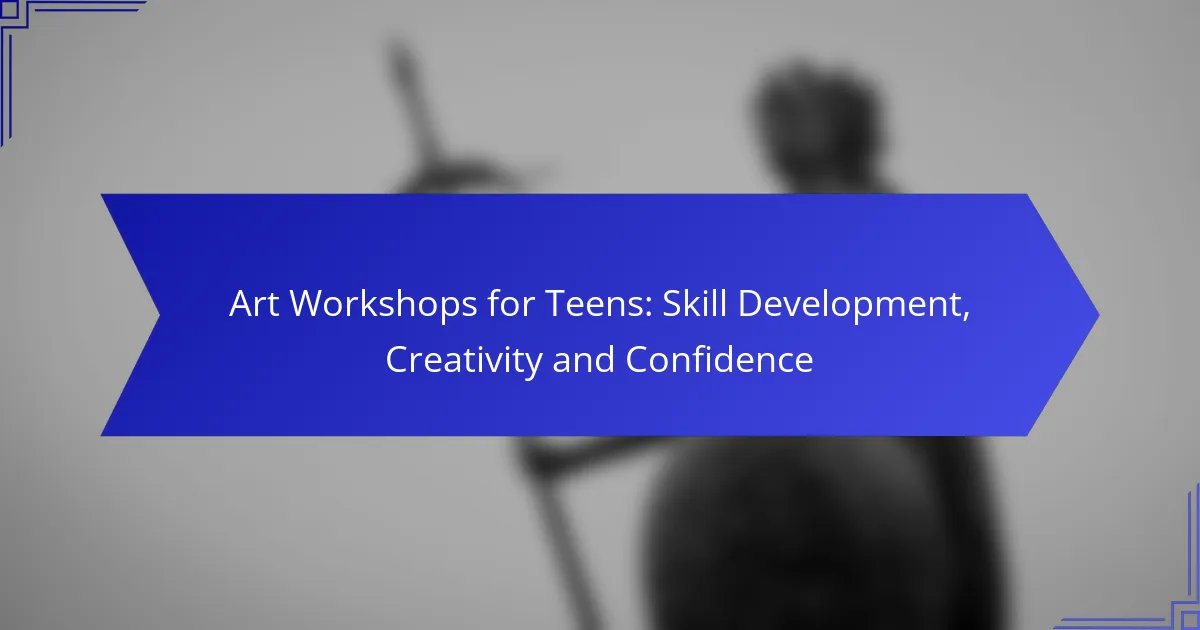Art workshops for teens are designed to enhance skill development, foster creativity, and build confidence in young artists. By offering hands-on experiences across various art forms, these programs empower participants to express themselves while mastering essential techniques. In a structured environment, teens can explore their artistic abilities, encouraging innovative thinking and collaboration.

What are the best art workshops for teens in the US?
The best art workshops for teens in the US focus on skill development, creativity, and building confidence. These programs offer hands-on experiences in various art forms, helping young artists express themselves while learning essential techniques.
Creative Arts Workshop
Creative Arts Workshop provides a nurturing environment for teens to explore different artistic mediums, including painting, drawing, and sculpture. Participants can expect to engage in both guided projects and independent exploration, fostering their unique artistic voices.
This workshop often features exhibitions where students can showcase their work, which boosts their confidence and allows them to receive constructive feedback from peers and instructors. Workshops typically run for several weeks, with sessions available during the summer and school breaks.
Art Studio of the Rockies
Art Studio of the Rockies offers immersive art experiences tailored for teenagers, focusing on both traditional and contemporary techniques. The studio emphasizes the importance of creativity and personal expression, encouraging students to experiment with various styles and materials.
Workshops are often led by experienced artists who provide mentorship and guidance. Programs may include collaborative projects, allowing teens to work together and learn from one another, which enhances their social skills alongside their artistic abilities.
Young Artists Academy
Young Artists Academy is designed specifically for aspiring teen artists, offering specialized classes in areas such as digital art, photography, and mixed media. The academy aims to equip students with both technical skills and creative thinking, preparing them for future artistic endeavors.
Classes are structured to accommodate different skill levels, ensuring that each participant receives personalized attention. Additionally, the academy often organizes field trips to galleries and art events, providing students with exposure to the broader art community and inspiration for their own work.
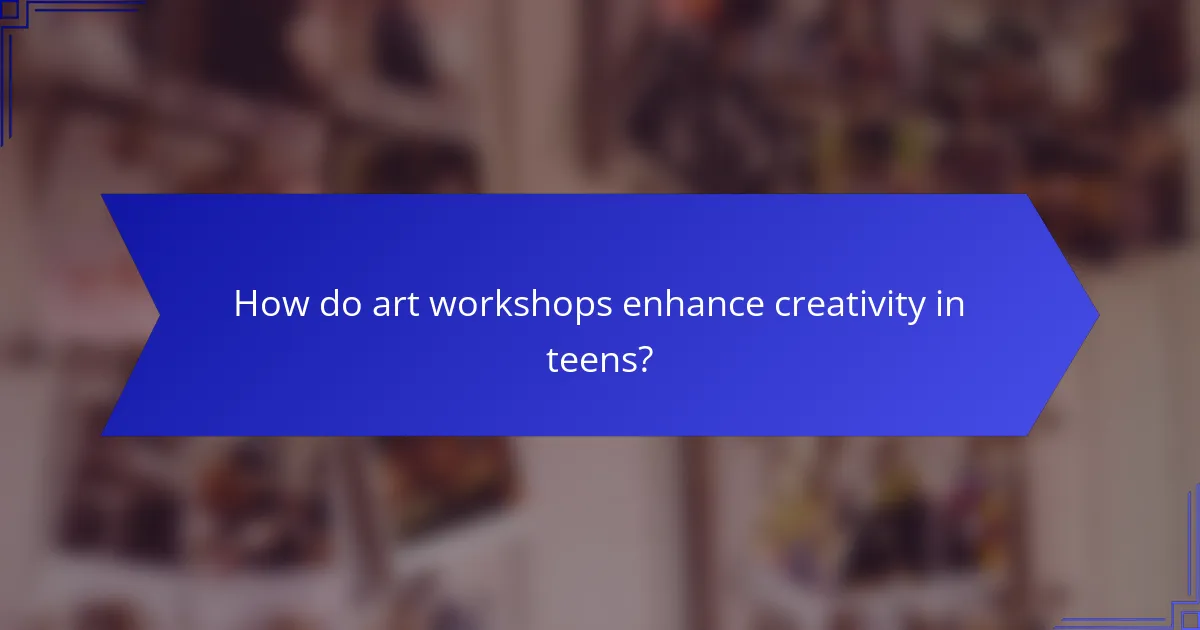
How do art workshops enhance creativity in teens?
Art workshops significantly boost creativity in teens by providing structured environments where they can explore their artistic abilities. These workshops encourage self-expression and innovative thinking, allowing participants to develop unique ideas and solutions through artistic practices.
Hands-on projects
Hands-on projects are central to art workshops, as they engage teens in practical activities that stimulate creativity. By working on tangible tasks, such as painting, sculpting, or crafting, participants can experiment with different techniques and materials, leading to a deeper understanding of artistic concepts.
Teens benefit from collaborative projects that foster teamwork and communication. For example, creating a mural as a group can enhance their ability to share ideas and learn from one another, ultimately enriching their creative process.
Exposure to various mediums
Exposure to various artistic mediums is crucial for enhancing creativity in teens. Workshops often introduce participants to a range of materials, including acrylics, watercolors, clay, and digital tools. This variety allows teens to discover their preferences and strengths, which can inspire new artistic directions.
Encouraging experimentation with different mediums can lead to unexpected results and innovative ideas. For instance, combining traditional painting with digital design can create unique artwork that reflects a teen’s personal style. It’s essential to provide guidance on how to use these mediums effectively while allowing room for personal exploration.
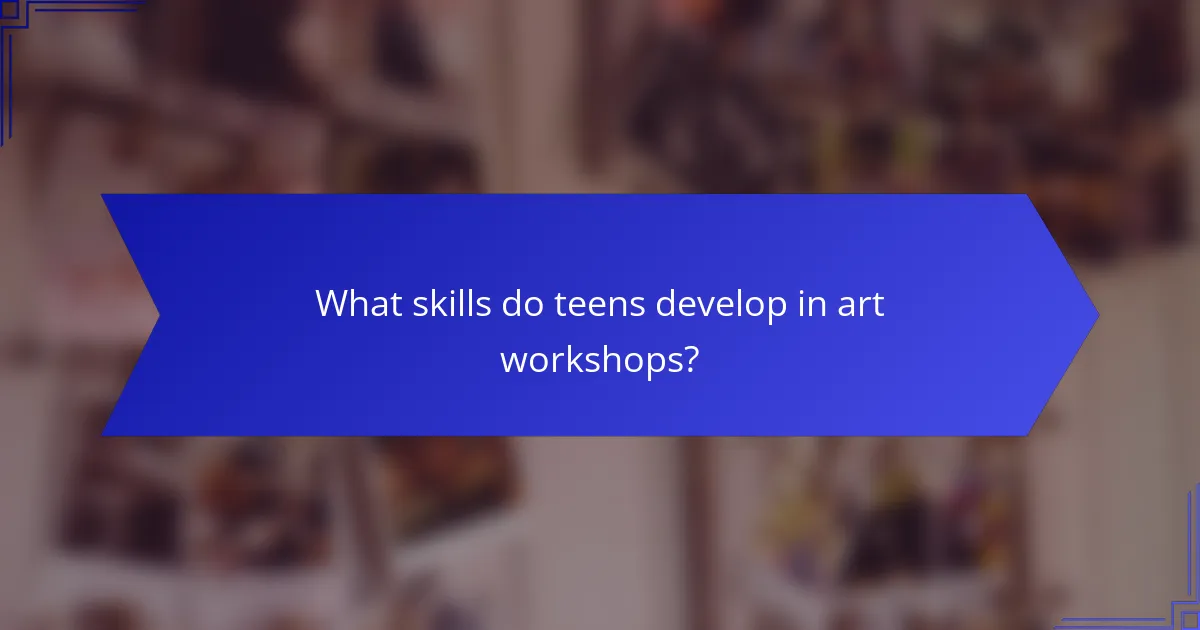
What skills do teens develop in art workshops?
Teens develop a variety of skills in art workshops, including technical art skills, critical thinking, and collaboration. These workshops provide hands-on experiences that enhance creativity and build confidence in their artistic abilities.
Technical art skills
In art workshops, teens learn essential technical skills such as drawing, painting, sculpting, and digital art techniques. These skills are often taught through guided projects that allow participants to practice and refine their abilities.
Workshops may cover various mediums, from watercolors to acrylics, and introduce tools like brushes, palettes, and digital software. By experimenting with different techniques, teens can discover their preferred styles and improve their craftsmanship.
Critical thinking
Art workshops encourage teens to engage in critical thinking by analyzing their work and the work of others. Participants learn to evaluate artistic choices, consider the impact of color and composition, and explore the meaning behind their creations.
Through discussions and critiques, teens develop the ability to articulate their thoughts and make informed decisions about their art. This process fosters a deeper understanding of artistic concepts and enhances their problem-solving skills.
Collaboration
Collaboration is a key component of many art workshops, where teens often work together on projects or participate in group critiques. This teamwork helps them learn to share ideas, provide constructive feedback, and appreciate diverse perspectives.
Working collaboratively can also lead to the creation of larger-scale projects, such as murals or installations, which require coordination and communication. These experiences build social skills and prepare teens for future collaborative endeavors in both art and other fields.
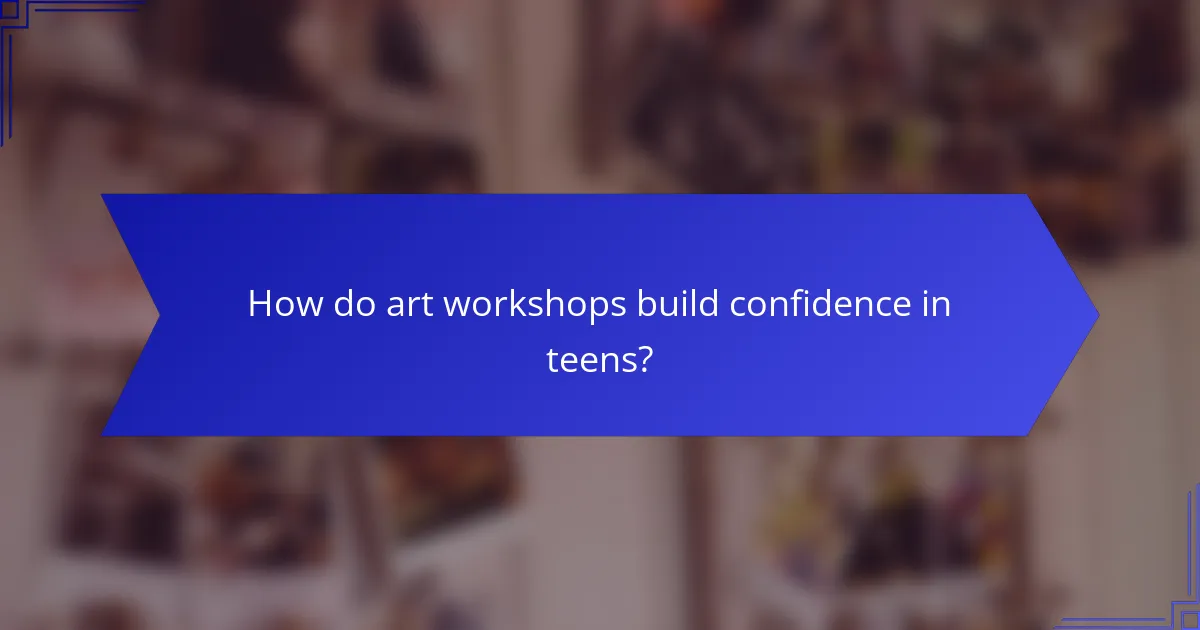
How do art workshops build confidence in teens?
Art workshops help build confidence in teens by providing a supportive environment where they can express themselves creatively. Through hands-on activities and constructive feedback, participants develop their artistic skills while gaining self-assurance in their abilities.
Positive feedback from instructors
Instructors play a crucial role in boosting teens’ confidence by offering positive feedback on their work. When teens receive encouragement and constructive criticism, they feel validated and motivated to improve. This supportive atmosphere fosters a sense of belonging and helps them take risks in their creative expression.
Instructors can use specific praise, such as highlighting unique techniques or ideas, to reinforce positive behavior. Regular feedback sessions can help teens understand their progress, making them more likely to engage and participate actively in future projects.
Showcasing artwork
Showcasing artwork is an effective way to enhance confidence in teens. Exhibiting their creations in galleries, community centers, or online platforms allows them to share their work with a broader audience. This visibility not only validates their efforts but also encourages them to take pride in their artistic journey.
Participating in art shows or competitions can further motivate teens to refine their skills. Setting up a small exhibition at school or local events can provide a platform for recognition, fostering a sense of achievement and encouraging ongoing artistic exploration.
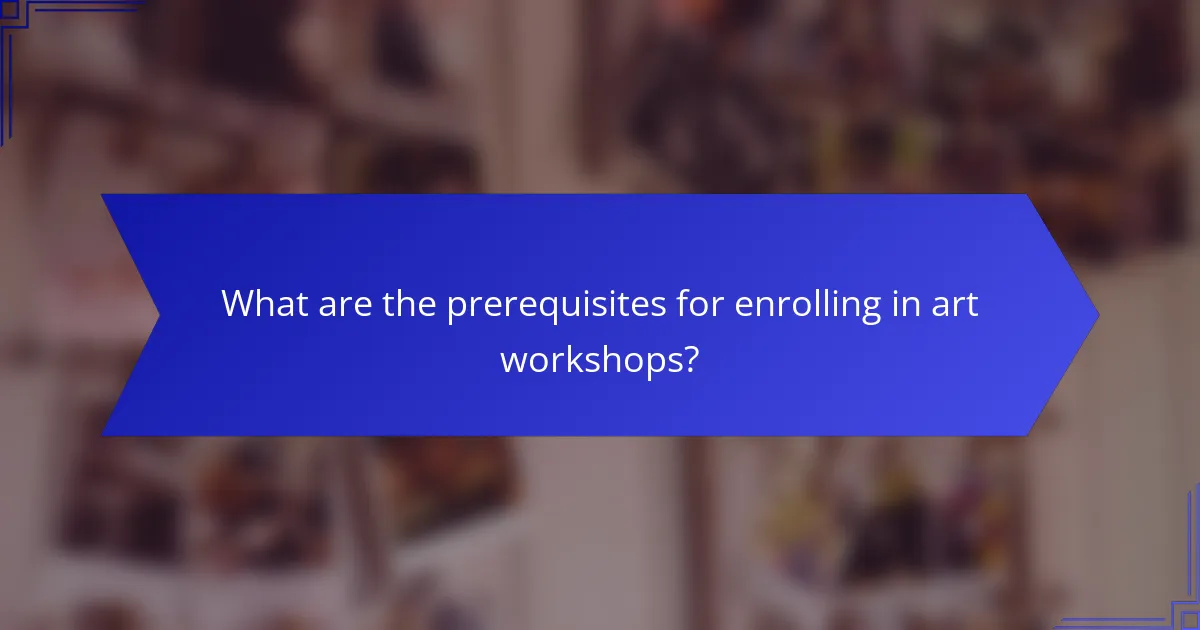
What are the prerequisites for enrolling in art workshops?
Prerequisites for enrolling in art workshops typically include age restrictions and skill level assessments. These criteria ensure that participants are matched with appropriate classes that suit their developmental stage and artistic abilities.
Age requirements
Most art workshops for teens are designed for participants aged between 13 and 19 years. Some programs may accept younger students, but this often depends on the specific workshop’s focus and structure. Always check the workshop details to confirm the age range.
In some cases, workshops may offer different sessions tailored to various age groups, allowing for a more customized learning experience. This can help ensure that the instruction is relevant and engaging for each age bracket.
Skill level assessments
Skill level assessments are often conducted to gauge a participant’s artistic abilities before enrollment. These assessments can take the form of a portfolio review, a short interview, or a preliminary art exercise. The goal is to place students in workshops that match their skill level, whether they are beginners or more advanced artists.
It’s beneficial for students to prepare a few pieces of their artwork to showcase their skills during the assessment. This can help instructors better understand the student’s strengths and areas for improvement, leading to a more tailored educational experience.
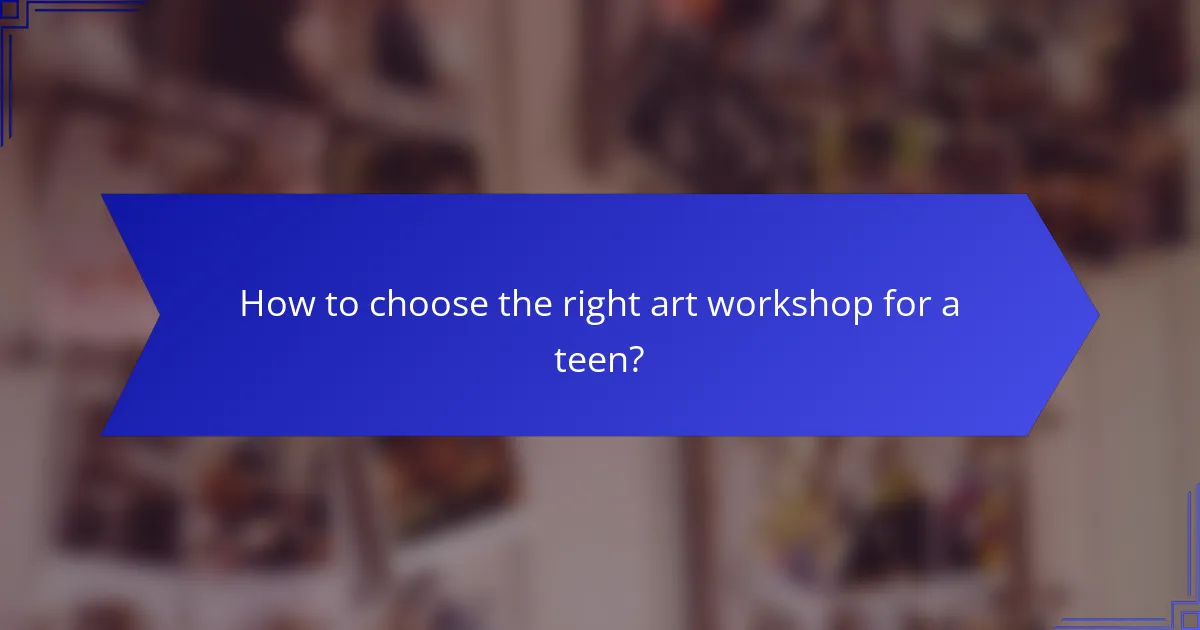
How to choose the right art workshop for a teen?
Selecting the right art workshop for a teen involves understanding their artistic interests, evaluating the qualifications of instructors, and checking reviews from past participants. These factors ensure that the workshop aligns with the teen’s creative goals and provides a supportive learning environment.
Consider artistic interests
Evaluate instructor qualifications
Check workshop reviews

What are the pricing options for art workshops?
Art workshops for teens typically offer a range of pricing options depending on factors such as duration, materials included, and the instructor’s expertise. Prices can vary from affordable community classes to more expensive specialized sessions.
Community Workshops
Community workshops often provide the most budget-friendly options, with prices generally ranging from $10 to $50 per session. These workshops may be held in local art centers or schools and often focus on basic skills and techniques.
Consider checking local community boards or websites for upcoming events. Many organizations offer discounts for early registration or group sign-ups, making these workshops even more accessible.
Private Lessons
Private art lessons can be more expensive, typically costing between $30 and $100 per hour. These sessions are tailored to the individual’s skill level and artistic interests, allowing for personalized guidance and feedback.
When considering private lessons, evaluate the instructor’s experience and teaching style. It’s often beneficial to schedule a trial lesson to ensure a good fit before committing to a series of sessions.
Specialized Workshops
Specialized workshops, which may focus on specific mediums or advanced techniques, usually range from $50 to $200 per session. These workshops often feature guest artists or professionals, providing unique insights and skills.
Look for workshops that include all necessary materials in the price, as this can save additional costs. Keep an eye out for seasonal promotions or scholarships that may be available to offset expenses.
